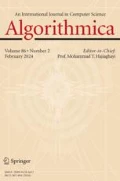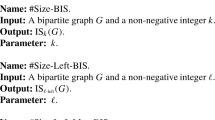Abstract
Two natural classes of counting problems that are interreducible under approximation-preserving reductions are: (i) those that admit a particular kind of efficient approximation algorithm known as an “FPRAS”, and (ii) those that are complete for #P with respect to approximation-preserving reducibility. We describe and investigate not only these two classes but also a third class, of intermediate complexity, that is not known to be identical to (i) or (ii). The third class can be characterised as the hardest problems in a logically defined subclass of #P.
Similar content being viewed by others
Author information
Authors and Affiliations
Corresponding authors
Rights and permissions
About this article
Cite this article
Dyer, M., Goldberg, L., Greenhill, C. et al. The Relative Complexity of Approximate Counting Problems. Algorithmica 38, 471–500 (2004). https://doi.org/10.1007/s00453-003-1073-y
Received:
Revised:
Published:
Issue Date:
DOI: https://doi.org/10.1007/s00453-003-1073-y




